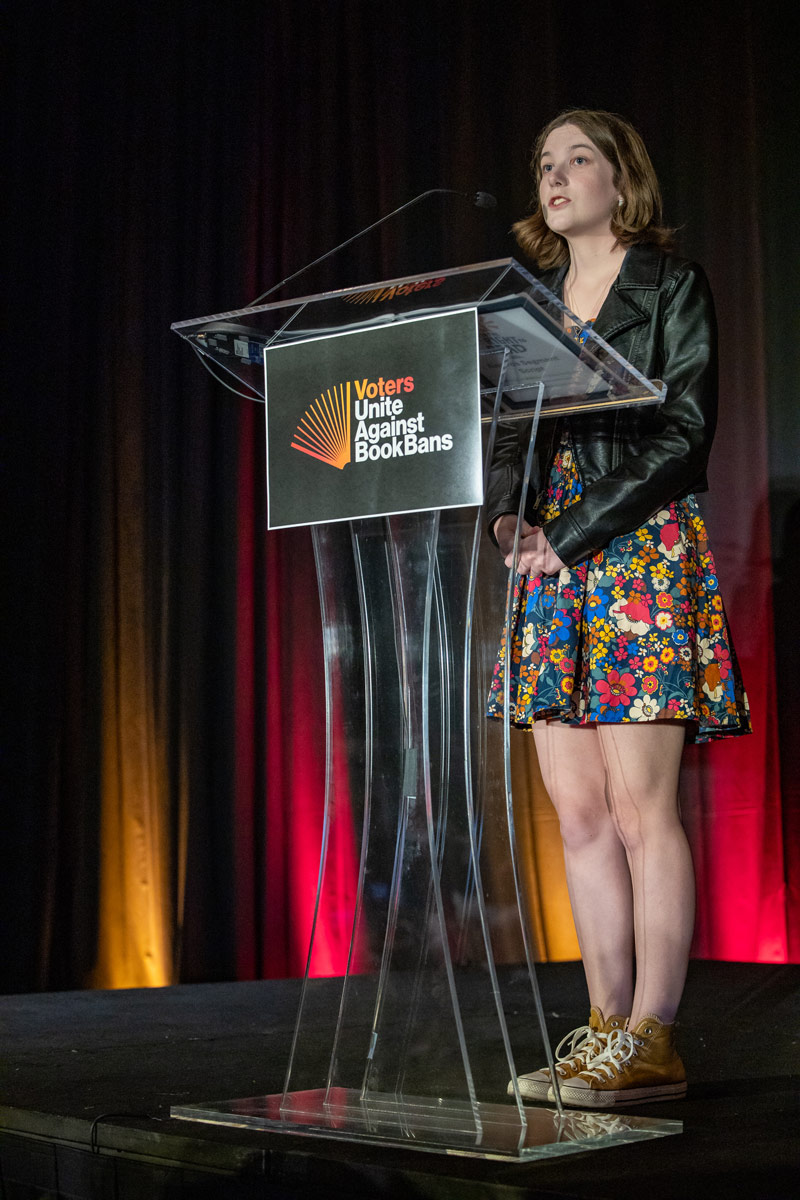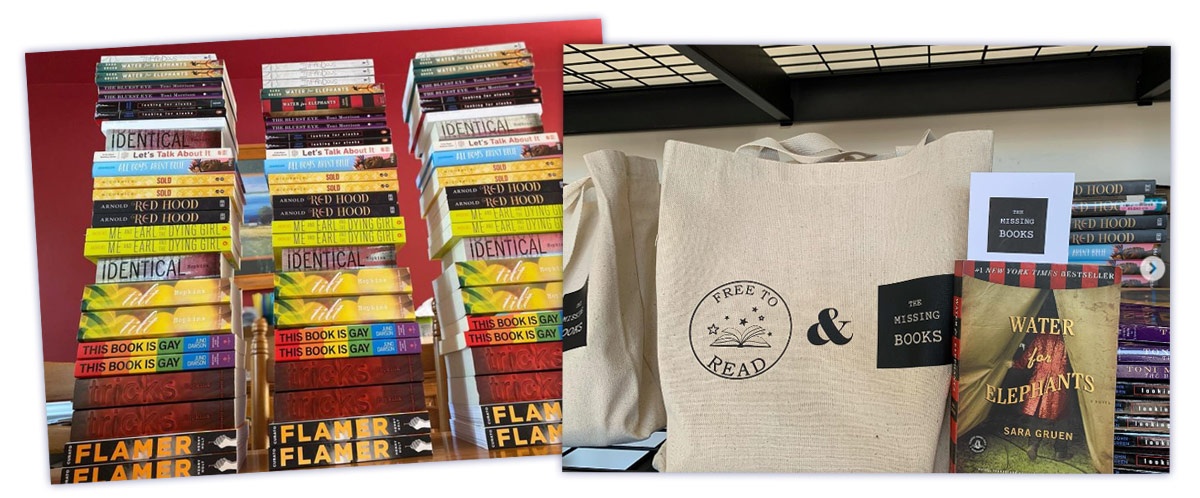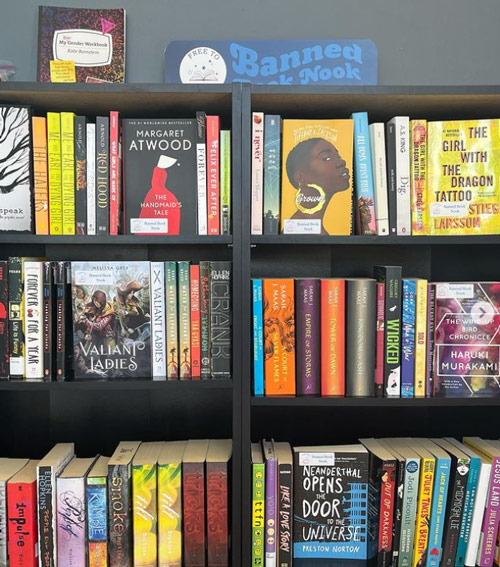Virginia Girl Scout Kate Lindley Discusses Her Year of Activism and the Importance of Fighting Book Bans | ALA Annual
Kate Lindley spoke to SLJ at ALA Annual, sharing the original goal of her Gold Award project, the reason fighting book banning is so important to her, and what's next for her after an extraordinary year.
 |
Kate Lindley at the podium during the Rally for the Right to Read event at ALA Annual. |
Kate Lindley was greeted with a standing ovation as she took the stage to receive a special citation from the Freedom to Read Foundation during the Rally for the Right to Read event on the first day of ALA Annual in San Diego. It was the kind of conference reception typically reserved for beloved authors and public figures.
Lindley was already well known to the audience of librarians, authors, and people in publishing. She is, to so many, “the Girl Scout from Virginia,” who garnered national attention for her Gold Award project to combat book banning in her county and then spoke out against those who sought to censor the proclamation honoring her achievement. The Freedom to Read Foundation citation is not her only honor for her work and advocacy against censorship in her community.
In the last few months, the Virginia Library Association awarded her a Presidential Citation, the Hanover County Democrats gave her one of its college scholarships, and she was named the inaugural recipient of the Virginia Children’s Book Festival’s Readership Champion Award, which “aims to honor those who have demonstrated exceptional dedication, innovation, and impact in advancing literacy and empowering individuals through education within their community.”
The day after she spoke to the crowd at the Rally for the Right to Read, the 18-year-old and her mother, Carrie, sat at the San Diego Convention Center and discussed the extraordinary previous 12 months—how it all began, the impetus for the Gold Award project, the reason it’s important to her, and her plans for the future.
The beginning
On June 13, 2023, Kate and Carrie were out of state on vacation but spent that evening watching the Hanover County (VA) School Board meeting online.
“We share a love of books,” Carrie said, and knowing the board would be voting on control of the schools and library materials and possible banning of books, they wanted to see what happened.
They watched, “horrified,” according to Carrie, as the board not only voted to give itself full authority over all books in school libraries and classrooms but also to immediately remove 19 titles from the schools’ libraries.
While the Lindleys thought the board's actions were terrible, Kate could have decided it didn’t impact her. The Lindleys live in Hanover County, but Kate attended Maggie L. Walker Governor’s School for Government and International Studies, a regional high school in Richmond, VA. Her diploma would be issued from her local high school, but no action taken by the Hanover County School Board would impact her access to titles at school.
That is not how she saw it.
“The ban still affects me, because it affects my community,” Kate said. “Even if I [could] check books out from my school library, many of my friends cannot. It is not merely the direct impact on me that is significant but also the principle of the ban—I refuse to live in a place where books about LGBTQ+ people, about minorities, or about complex subject matter are demonized.”
By the next morning, Kate began to formulate a plan. She knew that when scouts completed a Gold Award, the county’s Board of Supervisors honored them at a meeting, reading about the project and its purpose and presenting the scout with a proclamation.
 |
From the left: Stacks of donated books; Lindley's "Talk Totes" that were distributed at Hanover County high schools. |
“I thought, ‘Oh, I'm gonna do this project, and if I make it fit the parameters of Gold Award, I can make the Board of Supervisors look me in the eye and tell me what I did because of what [the school board] did,” she said.
She did not originally plan on doing a Gold Award project. As a matter of fact, she created a full academic schedule of college-level classes for her senior year of high school and factored in very little time for Girl Scouts. But the plan changed with that school board meeting. The Free to Read Instagram account launched the project on June 23, 2023—just 10 days after she and her mother watched the meeting—saying the goal was “to counter the book bans in Hanover County by restoring access to banned books.”
 |
One of the three Banned Book Nooks Lindley stocked at local businesses. |
Lindley created Banned Book Nooks in the area, stocking three local businesses with titles removed by the Hanover County School Board. Enough donations came in— including copies of Sold! from the oft-banned book’s author Patricia McCormick—to not only establish the nooks but fill little libraries in the area and give away titles at local events.
She also put together “Talk Totes” containing 10–15 copies of a banned title with discussion questions. A network of student ambassadors distributed the totes in each of the four county high schools. And she created an app to let people know where the books were and share information about and awards won by the books removed from the libraries. She did it all behind the Free to Read banner, not wanting to make the personal connection to the outside world.
“The project is what has been important from the start,” she said. “I was very scared of people having my name attached to this.”
Going public
In early local news stories about the book nooks, she originally went only by Kate. At one point, though, she said a couple of media outlets told her they couldn’t publish the story if they didn’t include her name. So, she made a decision.
“The story was more important than me not being a part of it,” she said, adding that people have been super supportive, especially at ALA, but “it is a little bit scary.”
Carrie Lindley knew her daughter had reason to be concerned. “But you’ve got to do the right thing,” Carrie said. “And she's doing the right thing.”
In going public, Kate Lindley added her name to the list of young people across the country who are stepping up and speaking out against censorship. Like the others, she hasn't escaped harassment. She avoids Facebook, where her mother monitors and screenshots comments and says “a couple of cyber bullies and some older grandmas” have nicknamed her daughter “porn princess.”
Despite this, Kate doesn’t regret the project or her decision to go public. It was too important, she said.
“This was a very public instance of book banning. It's very easy to see that the books have been banned. It's clear. It's evident,” she said contrasting it to the soft censorship often keeping books off the shelves in other places. “It's really important to me that we stop demonizing books like this, and we examine when they are publicly banned what knowledge people are afraid of the masses who are future voters reading? It's especially important to me that teenagers know and understand the literature that people don't want them to read.”
She earned the Gold Award, but the town meeting part didn’t go exactly as she planned. The Board of Supervisors originally refused to publicly acknowledge her accomplishment—at first denying the honor of the public proclamations to all Gold Award earners because of her, Lindley said. When pressured, the supervisors issued the proclamations at an April meeting but the board voted to "amend" the summary of Lindley’s project, and it made no mention of the reason for the project, banned books, or censorship.
She spoke at that April meeting, saying, “I would like to let you, the Board of Supervisors, know that you have bestowed upon me the greatest honor you could, greater than that of any proclamation, in your censorship of my Gold Award Project. You have shown the world that you are afraid to call something what it is, be that a banned book or a deselected one. Thank you for this recognition.”
Members of the community spoke in support of Lindley at the meeting. When the public comment portion ended, Board of Supervisors member Michael Herzberg responded to Lindley and her supporters by saying, "If anyone wants to support an author whose message is about pornography to children, then people have the right to do that. As a board member, I have a right to say no, that I don’t support that request; and I also have the right to say yes, I have the right to approve the substitute request so the Girl Scout could still get recognized for her Gold Award," according to CBS News Richmond.
After that meeting, Lindley's story gained national media attention. That spotlight that she never sought brought an increase not only in media interview requests but also book donations. Carrie said her husband joked the house might sink from all of the arriving Amazon
 |
Photo of Free to Read book donations from an April 29, 2023 Instagram post |
deliveries, “But we didn't want to put the brakes on without giving it its fair shake and without allowing enough books into the house that we could then put into the community so people who can't afford to buy books would have access to these important stories.”
To Kate, the people who need these books most are the ones who are having them taken away.
“It seems irresponsible to me, as a nation, to ban books from a community that is about to have to deal with all of these real issues, the real issues and perspectives presented in each one of the banned books,” she said of high schoolers most impacted by these bans. “It seems irresponsible to not be giving them access to material that helps them understand those issues.”
She knows first-hand how these titles can help.
“One of the books in particular, This Book is Gay, is something I read when I was trying to figure out my identity,” she said. “It was very important that I had access to that and was somewhat helpful [to] make me feel a little less alone.”
High schoolers, she said, often feel like they are the only ones going through something, and it is important to know they are not alone and there are others who understand what they are feeling.
"So proud"
The Free to Read project continues and, so far, has received and distributed more than 2,000 books.
“I'm just so proud of her activism,” said Carrie. “It's been amazing watching her grow from someone who is nervous and worried to someone who's like, ‘You know what? This issue is important enough to me. Say what you need to say. Your voice is smaller than all the other voices.’”
Now the family is preparing for Kate to go to college and major in computer science and public policy. She said this experience has opened her mind to the possibilities within that broad computer science field and possibly provided a focus—“Whether it [is] helping with information technology or something that has to do with freedom of information, which is for me, a very pertinent issue and something that I care about very much.”
Her advice to her peers? “Don't be apathetic. These issues are as much your business as everything else. Lack of caring is the killer of any movement. To not care about the fact that books are being banned from your high school library—that's the worst thing you can do. … Even if you don't want to do speeches about it, even if you can't be an activist, pick up a banned book, read it, and think about why it’s being banned.”
RELATED
The job outlook in 2030: Librarians will be in demand
The job outlook in 2030: Librarians will be in demand
ALREADY A SUBSCRIBER? LOG IN
We are currently offering this content for free. Sign up now to activate your personal profile, where you can save articles for future viewing






Add Comment :-
Be the first reader to comment.
Comment Policy:
Comment should not be empty !!!